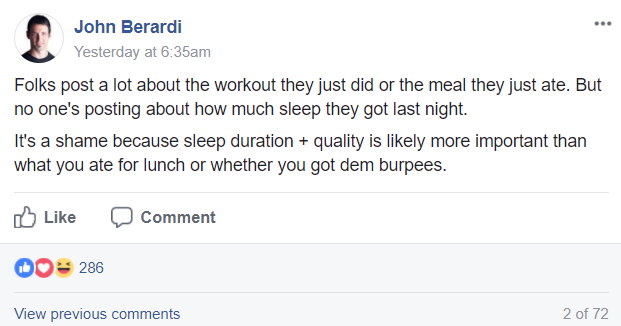Sleep More
I’ve been trying to sleep more, consistently, for the last few months. Initially this started as a fitness goal since everything I learn, states that recovery and sleep might be almost as important as the training and nutrition when it comes to gaining muscle, losing fat, etc.
See e.g.
- Sleep 101: Importance, Effects & Steps To Maximize Its Anabolic Potential!
- Precision Nutrition: All about Sleep
- Is sleep getting in the way of your body composition goals?
So I’ve been trying some of the suggestions in this article about hacking sleep. Over the last few months, I’ve increased my average sleep duration from under 6 hours to a little more than 7. I’d like to get closer to 8 blissful hours. I just feel better when I sleep more.
But there are hints, that sleep might be even more important than these initial articles, and my own personal experience, suggest.
Yesterday, John Berardi posted this comment to the Precision Nutrition Certification Students & Grads group on Facebook.

This aligns with a tantalizing post he made back in May 2017, about a research study in collaboration with UCLA on exercise, nutrition, and sleep. To summarize that longer post, sleep was the magic ingredient needed for dramatic body composition change. Hopefully the peer reviewed article will be published before the end of the year.
But muscle gains and fat loss aside, sleep is also astoundingly important for behavior and brain development. I sometimes get research publication alerts on former colleagues. Jim Sutcliffe (we went to grad school together, same PhD advisor) recently co-authored a manuscript, Shorter sleep duration is associated with social impairment and comorbidities in ASD. ASD is Autism Spectrum Disorder.
Let me sum up:
Decreases in sleep duration are associated with lower IQs, maladaptive behaviors, and reports of ADD, depressive disorder, and obsessive compulsive disorder in ASD. Regression results indicated that more severe social impairment, primarily a failure to develop peer relationships, is the core symptom most strongly associated with short sleep duration.
OK, fine, this is a group of kids who already have autism spectrum disorder, what about typical people? From the intro:
In typically developing children, sleeping too little is associated with attention, behavior, and learning problems. Insufficient sleep is also associated with increased risk for depression, and in teenagers, increased risk of self-harm, suicidal thoughts, and suicide attempts (Paruthi et al., 2016). Notably, recent evidence suggests that sleep promotes normal brain development (Kayser, Yue, & Sehgal, 2014) and sleep disruption during development may affect adult brain connectivity (Billeh et al., 2016). This indicates that sufficient sleep is essential for normal neuronal development. Sleep deprivation has been observed to affect the neural circuitry underlying emotional regulation, including abnormal connectivity of the amygdala and prefrontal cortex (Maski & Kothare, 2013); this abnormal amygdala-prefrontal cortex connectivity has also been observed in ASD (Wiggins & Monk, 2013).
I definitely need to prioritize sleep more.
I get on average about 5 hours of sleep a night. I read a ton of stuff that says you should get more sleep. But what if your body doesn’t seem to want more sleep? I don’t use an alarm clock and naturally wake up between 4:30 – 05:30 every day. The times when I have forced myself to stay in bed and sleep more, I end of feeling worse. I want to sleeping more because I’d like to get the health benefits that I’ve read about. Thoughts?
Clay – you might be one of the people who won the genetic lottery simply need less sleep. See e.g. http://www.bbc.com/future/story/20150706-the-woman-who-barely-sleeps – snippet from the article: A positive outlook is common among all of the short-sleepers that Fu has studied. “Anecdotally,” she says, “they are all very energetic, very optimistic. It’s very common for them to feel like they want to cram as much into life as they can, but we’re not sure how or whether this is related to their mutations.”
So, if you feel refreshed, alert and ready to go off exploring again….you probably have had all of the sleep you need. Lucky! I’m realizing that while I’ve survived for years on about 5 hours a night, that I don’t function at 100% doing that.
That’s interesting – the “short sleepers” – I thought maybe it was just conditioning. I went to bed at 11:30 last night and was wide awake at 4:30. If I go to bed earlier, I wake up earlier, so even when I’m tired I force myself to stay up longer because if go to bed at 9 i’ll be wide awake at 2. If I got up at 2 it would put me out of synch with the rest of my world. Even if I get drunk and have a late night. I’ll still be up early (my body will sometimes squeeze in an extra hour if i’ve been drinking). The things is when I do sleep, I SLEEP. It takes me about 30 seconds to fall asleep. And then I’m out.
I am jealous of your sleeping ability (30 seconds to sleep) and the fact you don’t need much. Nancy Kress built a great Sci-Fi world in the 80’s (starting with Beggars in Spain) around genetic engineering to create “sleepless” – as you might expect their productivity was amazing and created a new type of class warfare – sleepers vs. sleepless.